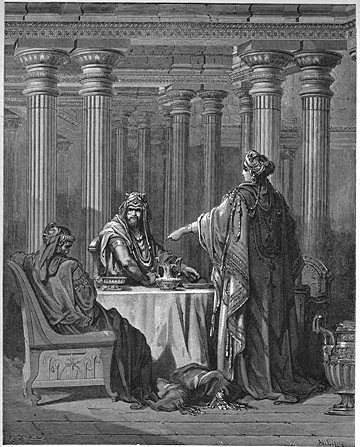Esther 7
1 Ọba àti Hamani sì lọ sí àpèjẹ pẹ̀lú Esteri ayaba,
So the king and Haman came in, to banquet with Esther the queen.
2 bí wọ́n sì ṣe ń mu wáìnì ní ọjọ́ kejì yìí, ọba sì tún béèrè pé, “Esteri ayaba, kí ni ẹ̀bẹ̀ rẹ? A ó sì fi fún ọ. Kí ni ìbéèrè rẹ? Bí ó tilẹ̀ jẹ́ ìdajì ìjọba à mi, n ó fi fún ọ.”
Then said the king unto Esther, on the second day also, during the banquet of wine, What is thy petition, Queen Esther, that it may be granted thee? and what is thy request—unto the half of the kingdom—that it may be performed?
3 Nígbà náà ni ayaba Esteri dáhùn, “Bí èmi bá rí ojúrere rẹ, ìwọ ọba, bí ó bá sì tẹ́ ọláńlá à rẹ lọ́rùn, fún mi ní ẹ̀mí mi, èyí ni ẹ̀bẹ̀ mi. Kí o sì pa àwọn ènìyàn mi mọ́—èyí ni ìbéèrè mi.
Then answered Esther the queen, and said, If I have found favour in thine eyes, O king, and if, unto the king, it seem good, let my life be granted me, as my petition, and my people, as my request;
4 Nítorí a ti ta èmi àti àwọn ènìyàn mi fún àwọn tí yóò pa wá run, à ti ṣe ìdájọ́ wa fún pípa àti píparẹ́. Bí a bá tilẹ̀ tà wá bí ẹrúkùnrin àti ẹrúbìnrin, ǹ bá dákẹ́, nítorí irú ìpọ́njú bẹ́ẹ̀ kò tó èyí tí à ń yọ ọba lẹ́nu sí.”
For we are sold, I and my people, to be destroyed, to be slain and to be caused to perish. If indeed, for bondmen and for bondwomen, we had been sold, I had held my peace, although the adversary could not have made good the damage to the king.
5 Ọba Ahaswerusi bi Esteri ayaba léèrè pé, “Ta a ni ẹni náà? Níbo ni ẹni náà wà tí kò bẹ̀rù láti ṣe irú nǹkan bẹ́ẹ̀?”
Then spake King Ahasuerus, and said unto Esther the queen, —Who is he now, and where is he, whose heart is set to act thus?
6 Esteri sọ wí pé, “Alátakò àti ọ̀tá náà ni Hamani aláìníláárí yìí.” Nígbà náà ni Hamani wárìrì níwájú ọba àti ayaba.
And Esther said, A man who is an adversary and enemy, this wicked Haman. And, Haman, was terrified, before the king and the queen.
7 Ọba sì dìde pẹ̀lú ìbínú, ó fi wáìnì sílẹ̀ ó sì jáde lọ sí àgbàlá ààfin. Ṣùgbọ́n nígbà tí Hamani, ti rí i dájú pé ọba ti pinnu láti pa òun, ó dúró lẹ́yìn láti bẹ Esteri ayaba nítorí ẹ̀mí rẹ̀.
Now, the king, arising in his wrath from the banquet of wine, and going into the palace garden, Haman, stood to make request for his life from Esther the queen, for he saw that ruin, was determined against him, by the king.
8 Bí ọba ṣe padà dé láti àgbàlá ààfin wá sí gbọ̀ngàn àsè náà, Hamani ṣubú sórí àga tí Esteri ayaba fẹ̀yìn tì. Ọba sì pariwo pé, “Yóò ha tún tẹ́ ayaba níbí yìí, nínú ilé, ní ojú mi bí?” Ní kété tí ọba sọ ọ̀rọ̀ yìí jáde, wọ́n da aṣọ bo Hamani lójú.
When, the king, returned out of the palace garden into the place of the banquet of wine, Haman, was lying prostrate upon the couch whereon Esther was. Then said the king, Will he, even dare to force the queen, while I am in the house? No sooner had the word gone forth out of the mouth of the king, than, the face of Haman, they had covered.
9 Nígbà náà Harbona ọ̀kan nínú àwọn ìwẹ̀fà tó ń dúró níwájú ọba, sọ wí pé, “Igi tí ó ga tó ìwọ̀n ẹsẹ̀ bàtà marunlélaadọrin ni Hamani ti rì sí ẹ̀gbẹ́ ilé e rẹ̀. Ó ṣe é fún Mordekai, ẹni tí ó sọ̀rọ̀ jáde láti ṣe ìrànlọ́wọ́ fún ọba.” Ọba wí pé, ẹ so ó rọ̀ sórí i rẹ́!
Then said Harbonah—one of the eunuchs before the king—Yea lo! the gallows that Haman made ready for Mordecai, who had spoken well for the king, is standing in Haman’s house, of a height of fifty cubits. Then said the king, Hang him thereon.
10 Wọ́n sì so Hamani sórí igi tí ó ti pèsè sílẹ̀ fún Mordekai, ìbínú ọba sì rọ̀.
So they hanged Haman on the gallows which he had prepared for Mordecai, —and, the wrath of the king, was appeased.





















